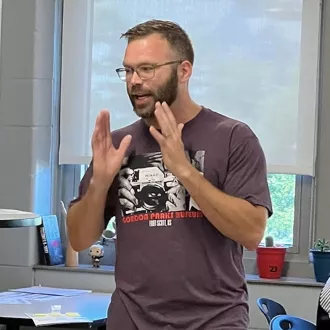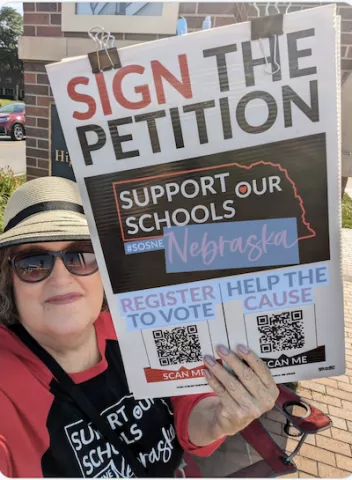
Key Takeaways
- Nebraska educators—not once, but twice—collected enough signatures to put the repeal of the state's first school voucher law on the November ballot.
- In Kentucky and Colorado, pro-voucher advocates are asking voters to amend the state constitution to open the door to school vouchers.
- Kentucky's constitution is the “last line of defense in ensuring that we have equitably funded public schools,” said one educator.
Chadron is a small agricultural town of around 5,000 residents located in Dawes County in the northern part of the Nebraska panhandle. Like many rural schools across the nation, Chadron High School, where Renae Noble teaches English, represents so much more to the community than just the place where their children learn.
“This is where it all happens,” she says. “We’re a very small town in a remote area. We’re the hub of the community and people love our public schools.”
Funding challenges in Dawes County persist, however. As a rural county, surrounded by federal and state-owned lands, “we don’t have huge tax base as it is,” Noble says. “The last thing our schools need is funding being taken away to pay for private school tuition.”
Facing such a threat, Noble and educators across the state are mobilizing to repeal a school voucher law passed by the Nebraska legislature earlier in 2024. LB1402 creates a statewide school voucher program that would funnel critical funding from public schools to subsidize private school tuition. Nine out of ten students in the state attend public schools.
But Nebraska voters will get the last word. Educators like Noble stood on street corners, canvassed door to door, attended state fairs, concerts, and farmers’ markets, to collect enough signatures to put the law on the state ballot (Measure 435) in November.
The future of school vouchers is also on the ballot in Kentucky, where voters will be determining the fate of Amendment 2. If approved, the measure will dismantle language in the state constitution that has so far prohibited public money being funneled to private schools and other privatization schemes.
“This would be a radical and dangerous change,” said Kevin Dailey, a teacher in Boone County. Dailey says the impact on already underfunded schools in low-income and rural areas would be devastating.
“A public school is place where students know there is going to be clean water and electricity and heat or air conditioning. It is a vibrant place and, for many kids, the only place where they are accepted and protected. Now, the state may change our constitution to allow for vouchers and gut our public school funding.”
Letting the Voters Decide
Nebraska educators only had 67 days—the shortest timeline for a petition drive in the state’s history—to collect the necessary signatures to put the repeal of LB1402 on the November ballot.
On July 17, the Nebraska State Education Association (NSEA) and their allies in the Support Our Schools Nebraska coalition, submitted more than 86,000 signatures to the Secretary of State—far more than enough to ensure the issue will appear on the ballot. The group also collected the signatures of 5 percent of voters in more than 60 of the state’s 93 counties.
It was an impressive feat, especially considering that this was the second petition drive. After educators succeeded the previous summer in putting the voucher bill on the ballot, pro-privatization lawmakers repealed the law in question—nullifying the referendum—but approved a new voucher law.
“We had to do it all over again and in less time” says Noble. “The challenge was explaining to folks who signed it [the petition to repeal the first voucher law] months earlier why they had to do it again. But we did it. They were happy to sign again.”
Retired educator Rita Bennett, who gathered signatures in Lincoln, saw the same level of enthusiasm for the second voucher repeal campaign. “The response was phenomenal. People flocked to us.”
Voucher proponents were far from done, however. They immediately filed a petition with the Nebraska State Supreme Court to block the referendum, arguing that the voucher legislation was an appropriation measure and therefore exempt from the provision in the Nebraska Constitution concerning voter referendum rights. In September, the Court, in a unanimous ruling, rejected that argument, allowing the referendum to stay on the ballot.
There’s a reason Nebraska lawmakers fought so hard to deny voters a voice, says Josh Cowen, professor of education policy at Michigan State University. “When voters get to decide on school vouchers in a statewide ballot, vouchers lose. Those pro-voucher politicians in Nebraska know what the record is.”
A Blank Check
Measure 435 in Nebraska is straightforward enough. Voters will be asked to repeal or retain a law that sets aside funds to “pay all or part of the cost to educate eligible students attending nongovernmental, privately operated elementary and secondary schools.”
Amendment 2 in Kentucky, on the other hand, is asking voters to change the state constitution. Privatization proponents in Kentucky—and outside corporate interests—pushed the measure because the Kentucky Supreme Court ruled in 2022 that the state constitution requires voter approval before public funds may be spent on private schools. Amendment 2 is intended to ensure that requirement, along with other provisions used to challenge the 2022 program, could no longer serve as barriers to vouchers.
“Our constitution is that last line of defense in ensuring that we have equitably funded public schools in every single community all across the commonwealth,” says Eddie Campbell, president of the Kentucky Education Association (KEA).
Quote byKevin Dailey, Teacher, Boone County, KY

If approved by voters in November, Amendment 2 will clear a path for voucher legislation. Voucher proponents, aware of these schemes’ unpopularity, insist the amendment is not connected to any specific legislation or issue. But KEA members know better and have worked tirelessly to educate the public about the amendment’s true intent. KEA and its partners came together to form Protect Our Schools Kentucky, a coalition of more than 100 education advocacy and community groups to warn the voting public about the dangers of Amendment 2.
Amendment 2 would establish “an unfettered power to write a blank check to unaccountable private institutions at the expense of our public schools,” says Campbell.
With that new power, lawmakers could enact a universal voucher program similar to those in Florida and Arizona, the two largest programs in the nation. According to a report by the Kentucky Center for Economic Policy, a voucher law proportional to what Florida has would drain $1.19 billion annually from the Kentucky state budget—or the the cost of employing 9,869 Kentucky public school teachers and employees. Even a voucher program a mere one-sixth the size of Florida's would cost the state almost $200 million annually.
Meanwhile, in Colorado, voters in November will determine the fate of Amendment 80, which enshrines parents’ “right to direct the education of their child,” along with the individual “right to school choice.” Proponents contend that the amendment exists only to protect Colorado’s existing school choice laws and its charter schools, but the amendment defines “school choice” to include private and home schools as well as other “future innovations in education.”
The Colorado Education Association (CEA) calls Amendment 80 unnecessary, duplicative, and misleading.
“Proponents of Amendment 80 have been working to mislead voters since this campaign started,” said CEA President Kevin Vick. “Claiming this measure is about protecting school choice—which Colorado parents have had for 30 years—when it’s really about opening the door to creating a voucher system.”
Cautious Optimism
“Anyone who lives in the Nebraska Panhandle, or has spent any time here, is not going to see many private schools,” says Renae Noble. “School vouchers are not going to help many families in this part of the state.” Most rural areas usually do not have enough students to provide the conditions to create a second school.
If the repeal effort fails, Noble says, “public money for our schools will begin to flow away from the panhandle and we’ll be left out.”

Evidence from states that have enacted voucher programs reveal that these voucher programs have been funneling taxpayer dollars into largely unaccountable private schools instead of supporting public schools. A recent report by the Southern Poverty Law Center found that voucher spending in seven states doubled every year from 2008-2019, while public school funding declined during the same period.
And overwhelmingly, school vouchers are being used by families with children already in private school, not to provide new opportunities to needy students.
During the 2023-24 school year in Indiana, the average voucher recipient came from a family making six figures. And in Arizona, 80 percent of vouchers last year went to students who were already attending private schools. Similar trends can be seen in Ohio, Iowa, New Hampshire, West Virginia and other states as well.
Furthermore, most private schools that participate in these programs have minimum, if any, standards of accountability and do not open their doors to all students. In addition, there is scant evidence that voucher programs produce any improvement in student academic achievement, and many have produced significant negative impacts.
“We all know what these vouchers will do to our schools, but we’re battling a lot of disinformation from the other side, funded by these very wealthy national groups” says Kevin Dailey.
Dailey recently attended a school board meeting in Boone County where residents spoke out on Amendment 2. “Every single one of them was in opposition, whether it was a parent, a teacher, community member, it didn't really matter who they were. We don’t want this.”
In Nebraska, educators say they are cautiously optimistic that the referendum to repeal LB1402 will be successful (recent public opinion polls suggest 2 to 1 in favor of repeal) but, as the election nears, they have no intention of taking their foot off the gas.
“We know what we’re up against” said Rita Bennett in Lincoln. “And we’ve seen what has happened in other states with vouchers. It’s a dangerous road to go down. So, we're focusing on putting all the pieces together for people.”
